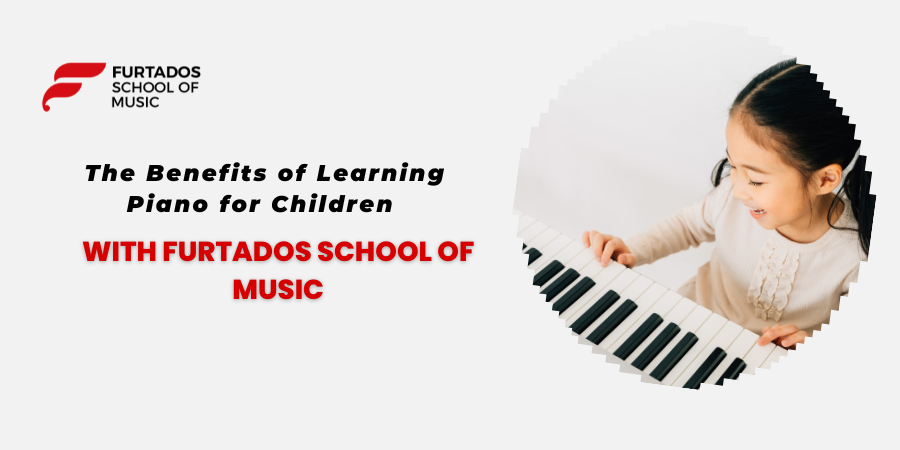When it comes to providing your child with a well-rounded education and a host of valuable life skills, learning to play the piano is a remarkable choice. At Furtados School of Music, we understand the profound impact that Benefits of Learning Piano can have on a child’s development and overall growth. In this article, we’ll explore the myriad benefits of enrolling your child in piano classes and how piano lessons can enhance their cognitive, emotional, and social development.
Benefits of Learning Piano :
- Cognitive Development
Learning piano is a fantastic way to stimulate cognitive development in children. It engages various areas of the brain simultaneously, enhancing their cognitive abilities in the following ways:
- Improved Memory: Playing the piano requires children to memorize musical pieces and read sheet music, which boosts memory retention and recall skills.
- Enhanced Problem-Solving: Learning to play complex musical compositions encourages critical thinking and problem-solving as children decipher intricate patterns and harmonies.
- Enhanced Mathematical Skills: The rhythm and timing involved in piano playing strengthen a child’s understanding of mathematical concepts, including fractions and ratios.
- Emotional Expression
Piano lessons offer an avenue for children to express their emotions and develop a deeper understanding of their feelings. Here’s how:
- Emotional Release: Playing the piano can serve as an emotional outlet, allowing children to express their joy, sadness, or frustration through music.
- Self-Expression: As children progress in their piano studies, they have the opportunity to create their compositions, fostering a sense of individuality and self-expression.
- Building Confidence: Successfully learning and performing a piece can boost a child’s self-esteem and confidence, promoting a positive self-image.
- Discipline and Patience
Learning to play the piano requires dedication, discipline, and patience. These qualities are instilled in children through consistent practice and progress monitoring:
- Time Management: Children must manage their time effectively to balance school, extracurricular activities, and piano classes. This teaches them valuable time management skills.
- Persistence: Learning a musical instrument is a journey that involves setbacks and challenges. Children develop resilience and perseverance as they work through difficulties.
- Setting Goals: Progress in piano playing is often measured through milestones and achievements, helping children set and work toward goals.
- Improved Motor Skills
Piano playing involves coordinated hand movements, finger dexterity, and hand-eye coordination. These fine motor skills are essential for various aspects of a child’s life:
- Hand-Eye Coordination: Reading sheet music while simultaneously pressing keys enhances hand-eye coordination, which can benefit other activities like sports and writing.
- Finger Strength: Playing the piano strengthens finger muscles, which can be advantageous in tasks such as typing or handwriting.
- Multitasking: Coordinating both hands and reading music requires multitasking skills that can be applied in various situations.
- Stress Reduction
Music, including piano playing, has been shown to reduce stress and promote relaxation. Children experience stress, too, and playing the piano can be a healthy coping mechanism:
- Relaxation: Engaging with music and playing the piano can help children unwind and reduce stress levels.
- Emotional Regulation: Learning to channel emotions into music can teach children how to manage and cope with stress and anxiety.
- Social Development
Piano classes also offer opportunities for social interaction and development:
- Peer Collaboration: Group lessons and recitals provide opportunities for children to collaborate with peers, fostering teamwork and social skills.
- Performance Confidence: Performing in front of an audience during recitals enhances public speaking and presentation skills.
- Cultural Appreciation: Learning piano often involves exploring various musical genres, and introducing children to diverse cultures and musical traditions.
- Lifelong Passion
Introducing children to the world of music through piano lessons can ignite a lifelong passion:
- Musical Exploration: Learning to play the piano may inspire children to explore other musical instruments or even pursue a career in music.
- Cultural Enrichment: Understanding and appreciating music from different cultures can enrich a child’s worldview and cultural sensitivity.
At Furtados School of Music, we believe in nurturing the potential within each child through the power of music. Our dedicated instructors provide personalized guidance in a supportive and inspiring environment. Whether your child aspires to become a concert pianist or simply wishes to enjoy the many benefits of playing the piano, our piano classes are tailored to their individual needs and aspirations.
In conclusion, the benefits of learning piano for children extend far beyond musical proficiency. It enriches their lives by enhancing cognitive skills, fostering emotional expression, instilling discipline, and promoting social development. Consider enrolling your child in piano lessons at Furtados School of Music to embark on a journey of lifelong learning, creativity, and self-discovery.
